Getting back to my folks’ place near Charlotte Harbor, on the west side of Florida, we were still itching to check out a few more boats in our last couple days in Florida. While we did not have to find a boat on this trip, we were enjoying the process. Moreover, we were also thinking that it would be nice to use our spring break to start working on the boat rather than to still be looking for it. And, though we were very interested in the Cabo Rico 38 we had looked at, Emily Luna, we recognized there may be other boats out there with less potential problems than her. So, we returned to Yachtworld.
Not wanting to make another three hour trip across the state, our boat options were more limited. However, we found two Tayana 37s that were just about an hour away in Fort Myers Beach. They were very close in price, but at the high end of our range. Regardless, it would be nice to be able to compare two Tayanas side-by-side. Unfortunately, in talking with the brokers, we discovered that someone had just put a deposit on the slightly more expensive of the two. Still, we made arrangements to see the other boat early the following morning.
We met the broker, Connie, at a neat little restaurant on the water just before you go over the bridge to Fort Myers Beach. Locals filled the dockside cafe and the smell of coffee wafted through the chilly – by Florida standards – air. Connie indicated the boat was docked in the small marina out front, and she led us out the door. Pelicans and other sea birds lined the pilings as we headed down the dock and commiserated about the upper forties temperature.
The listing for the boat was a bit of a mixed bag. There was an in-mast furling system, which for some people might be a selling point, but for me was a turnoff. I am not sold on the idea of a furling main, but definitely would prefer a furler on the boom to one on the mast. The in-mast systems not only seem to have more potential problems, but also place more weight aloft and prevent you from having any roach or battens. On the other hand, the boat was a relative baby, having been built in 1990. And she boasted an aft cabin, which was a rarity even amongst the highly customizable layouts on the 600 Tayanas that were built.
Looking down at her from the dock, the boat sure did not make a good first impression. The birds had been using her decks for a head, which just added to her miserable, worn out appearance. Getting aboard did not help matters. Though she sported both a Delta and CQR anchor, the chains were quite rusted and the windlass was worn. Similarly, the winches on the mast and cabintop initially looked good as they were self-tailing, but on closer inspection they would not turn at all. The rigging did not even try to fool you, as the corrosion at the base of the stays made its condition clear. And the edge of the mainsail peaking out from the furler was in sorry shape, which should come as no surprise considering the listing boasted that it was inspected and restitched back in 2005. To be fair, the boat did have a nice arch with davits, solar panels, a wind generator, and radar.
Going below, things went downhill quickly. Even I, who cannot even recount the layout after we are off the boat, noticed the cabin seemed terribly cramped with the aft cabin and cabinets over the galley really dividing up the space. Worse, evidence of leaks abounded including along the hull in the head, at the aft end of the v-berth (watch those drips when you are sleeping!), through the chainplates, and around many of the ports. But the most worrisome leaks came from a few rusted screws along the cabintop, making it seem that the teak decks might be in need of replacement despite the fact they looked to be in fairly good shape from above.
Another theme below was rust. Looking in the chain locker, a solid mass of rusted chain greeted me. But the biggest, and most disturbing, rust was that which covered the engine, making it clear the previous owners had not given the boat the care she deserved. And we have no idea what lurked in the bilges because we could not get a single access panel up because they were so swollen.
There were a few positive things, including some decent looking wiring (I hope I was not considering the wiring in the above image “decent”) and robust seacocks, but the negative far outweighed the positive. I expect that this Tayana will be on the market for some time to come, getting a little more worn with each passing day.
Margaret’s thoughts:
I have to say it – this boat – made the least impression on me of all the boats we have looked at. Before I looked over the pictures in anticipation of making this post I could not even recollect what color the cushions were in the cabin or the scale of the boat. I remembered that the space felt cramped despite the LOA of the vessel and knew it was because of the way the cabin was divided.
I was a bit unhappy about getting on this boat to begin with as we had to climb aboard via the bowsprit as the lines were tied too tight and the broker was not comfortable messing with the lines. I can understand her apprehension, but it did not make getting onto the poop covered boat any easier. The amount of bird droppings on the topsides was astounding making it pretty gross to test the systems and remove the canvas coverings. These issues, along with what we found below, helped us give this boat the title “The Bad Tayana”. Along the same lines as the Holy Jesus boat, this little darling needed a moniker to help us identify its true awfulness.
The companionway stairs led down to a dark and dank cabin with the galley to starboard and the aft cabin to port.
The aft cabin was in shambles with the cushions and berth top removed to expose access to the engine. It was hard to imagine what this space would look like under normal conditions as I could not determine where the boards or cushions were stored for the berth.
Forward of the aft cabin on the port side was a u-shaped settee.
The port settee could be made into a double berth by lowering the table and putting in cushion inserts. The condition of the cushions and covers were unusable with many showing signs of leaks and stains. Across the salon the starboard settee was long and slightly curved.
The head was forward to port with plenty of storage, including hanging lockers, to starboard.
The forward cabin is large with loads of storage in lockers, cabinets, and on the sides of the v-berth.
While this was not the boat for us, it did give us yet another boat design from which to make comparisons about size, joinery, woodwork, and overall condition. While I did not like the way that this boat was laid out, I did like the general size, especially the beam, height of the cabintop, size of the forward cabin and size of the head. I hope we have the opportunity to check out a Tayana with a single cabin layout in the future.
A few more images:
For more information on Tayana 37’s:

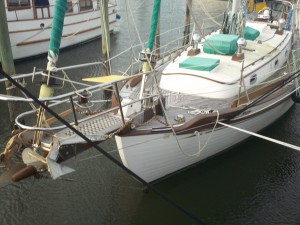
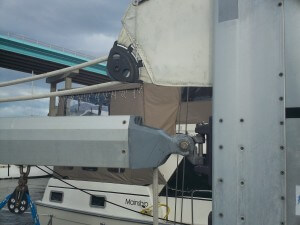
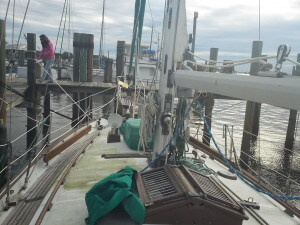
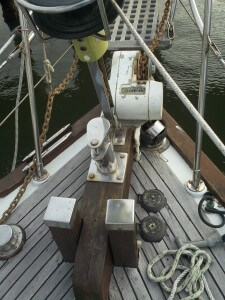
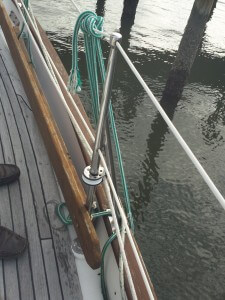
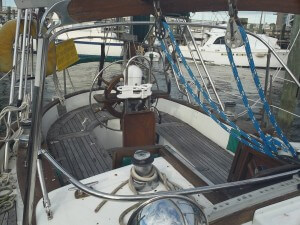
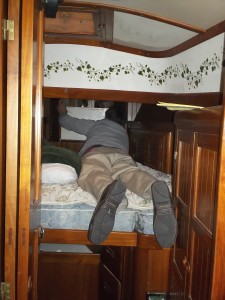
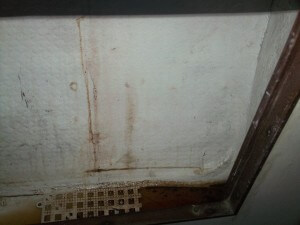
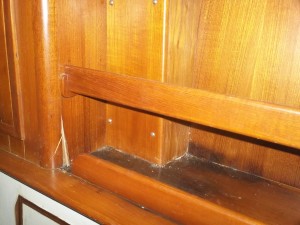
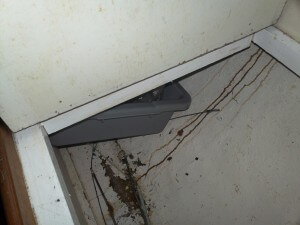
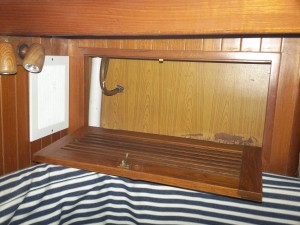
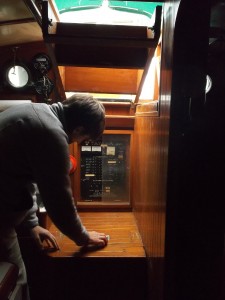
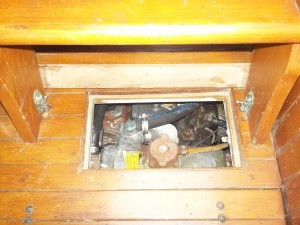
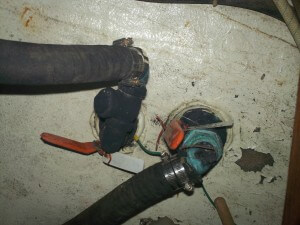
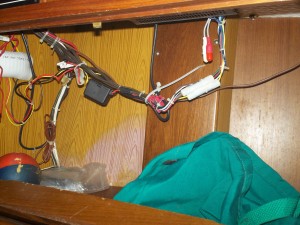
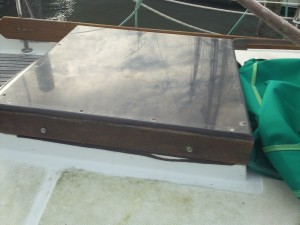
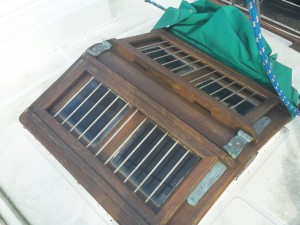
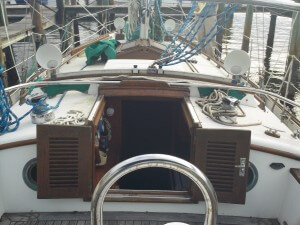
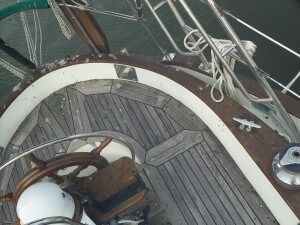
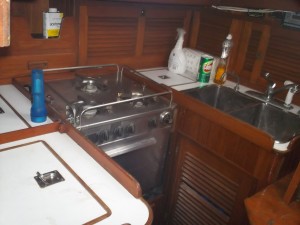
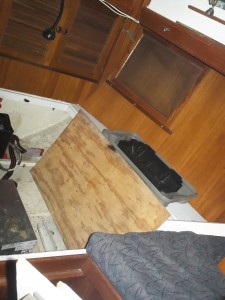
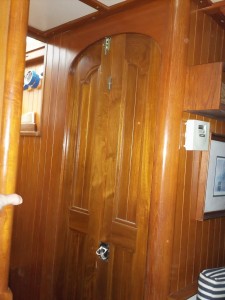
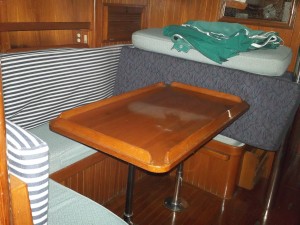
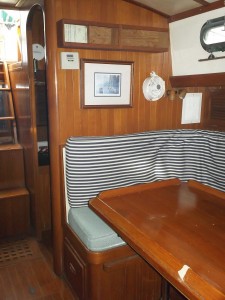
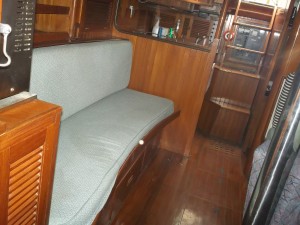
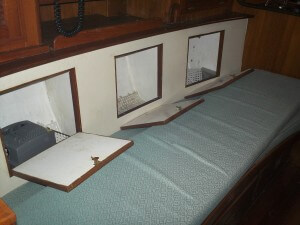
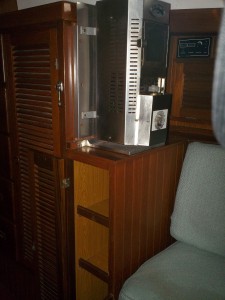
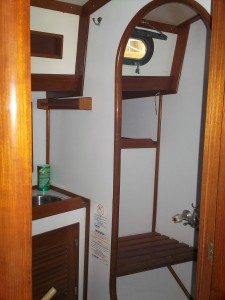
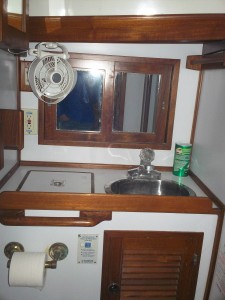
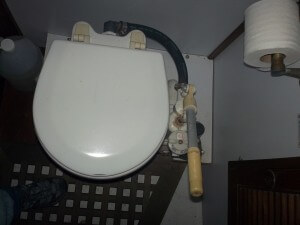
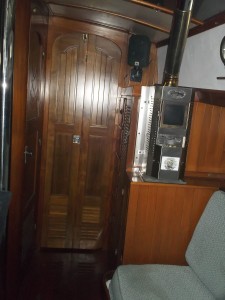
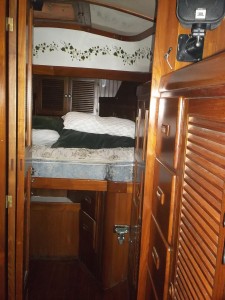
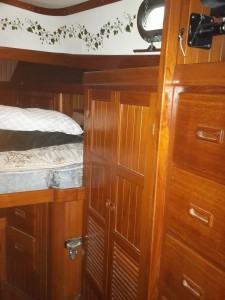
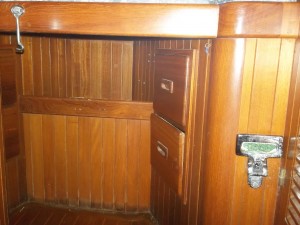
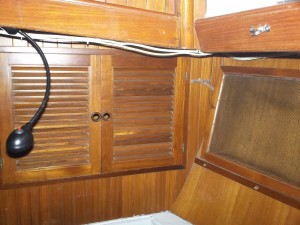
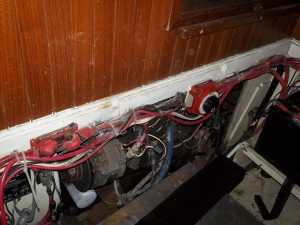
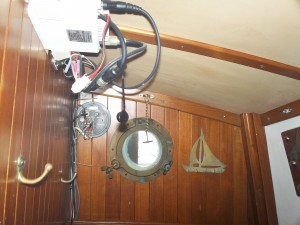
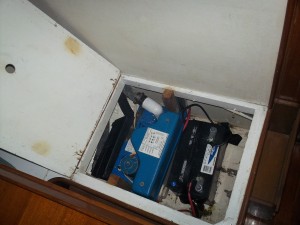
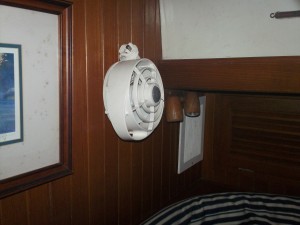
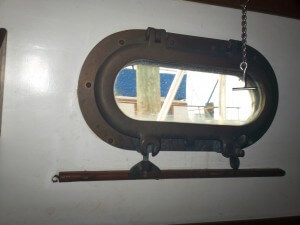
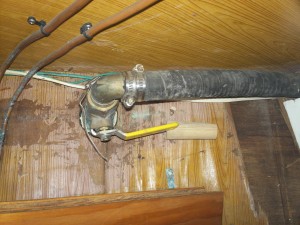
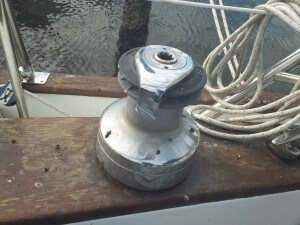
Reading this piece on the “Bad Tayana” was deja vu all over again. I have been looking for a decent and reasonably young (late 90’s) cruising yacht and have just about determined that the US market is nothing but overpriced yachts with the cancer of DIY. Americans simply do not take care of their yachts and for some reason glorify DIY when clearly they should have spent the money for professional work. Most owners DIY skills should be limited to mounting a teak cup holder on the helm pedestal.
When was the last time ANY US flagged yacht from the 80’s received a refit in the yard? There are exceptions of course, but that is exactly what they are exceptions.
Personally I am looking in the European market were yachts are NOT DIY and usually under management. They seem to be just a tad higher priced but I would much rather spend $90k for a Breehorn 37 than $120k for a worn out and cramped Pac Seacraft 37.
Americans also have not embraced aluminium alloy or steel boats either and that is a shame. Instead what the buyers are left with is old worn out yachts with questionable decks , chalky and glazed gel coat, badly repaired blisters, rusty anchor chain, windlasses and winches that are 30 years old and locked up, rigs that need to be removed, all listed by owners to lazy to keep them up and all pumped by brokers who quite frankly don’t care enough to make a boat presentable to sell. Those old and tired yachts belong in the boatyard of broken dreams.
Why did that broker even waste your time with that rotten old Tayana?